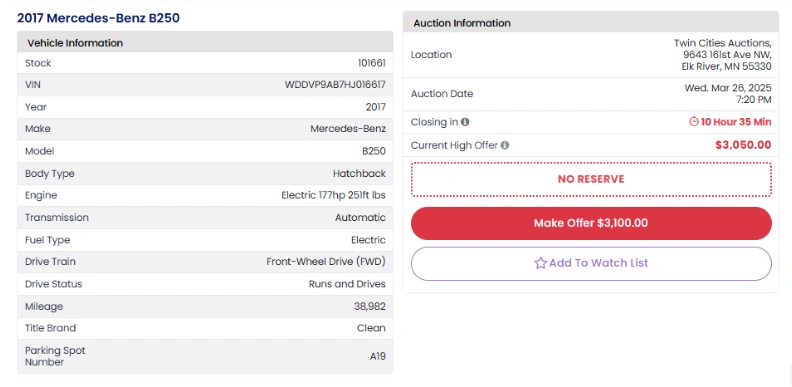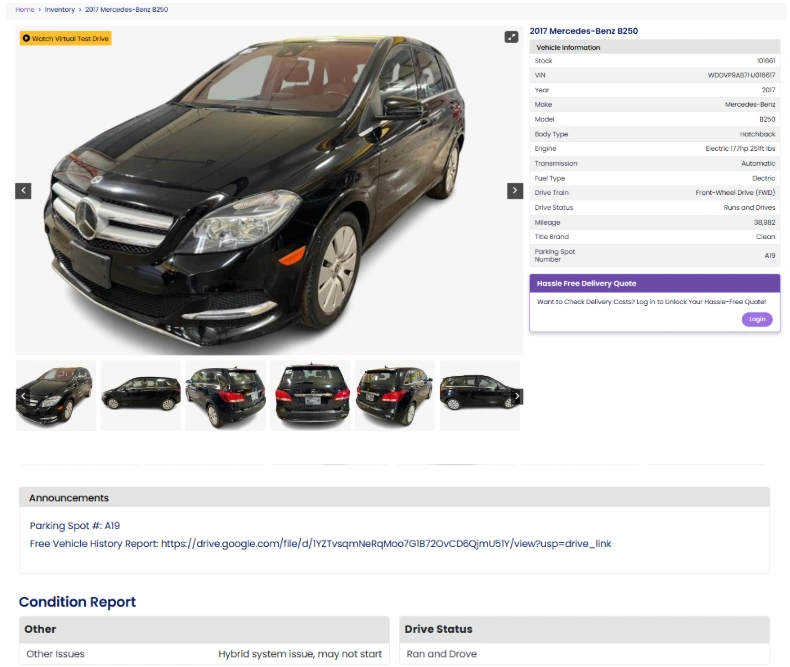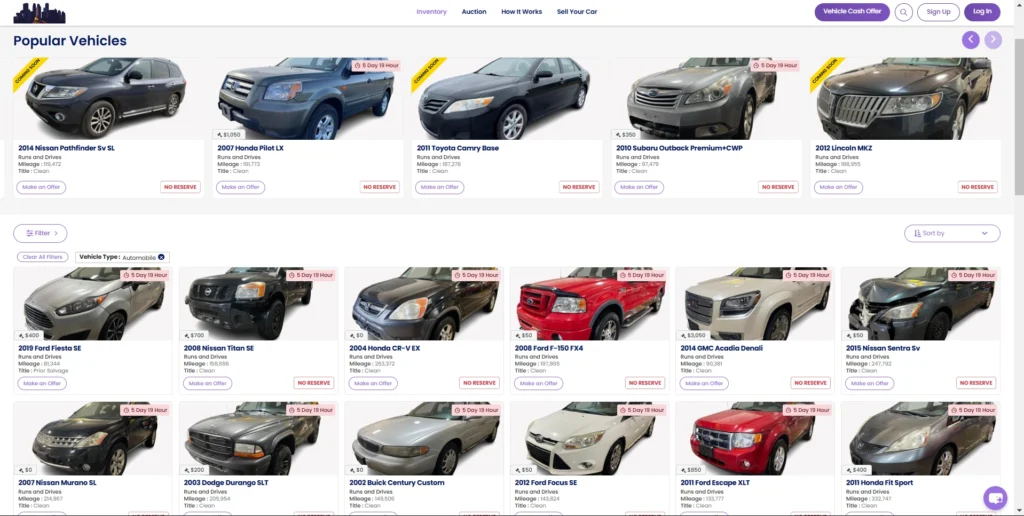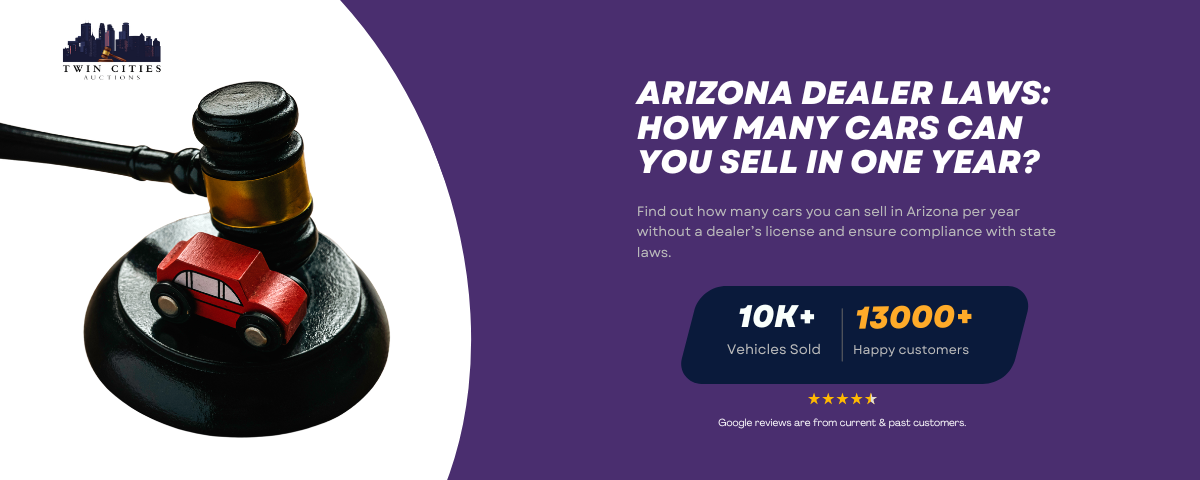Arizona dealer laws have become a hot topic for automotive enthusiasts and business owners alike. Did you know that Arizona permits individuals to sell up to six vehicles per year without needing a dealer license?
This fact not only affects casual sellers but also has implications for those considering a foray into full-time dealership operations. With changing regulations and evolving market dynamics, understanding these laws is essential for anyone involved in vehicle sales.
In this blog post, we will explore the ins and outs of Arizona dealer laws, compare them with practices in other states, and explain how these rules can impact your business.

Key Takeaways
- Arizona law allows non-dealers to sell up to six vehicles per year without requiring a dealer license.
- Exceeding the six-car limit means obtaining a dealer license and adhering to stricter regulatory standards.
- A detailed look into dealer regulations, vehicle sales limits, and best practices helps sellers navigate the complex landscape.
- Comprehensive tables compare Arizona dealer laws with other states, break down licensing requirements, and highlight the benefits of auction sales.
Understanding Arizona Dealer Laws
Arizona’s automotive market is dynamic, and its dealer laws are designed to maintain transparency while safeguarding both consumers and sellers. The core principle of these laws is to differentiate between occasional sellers and professional dealers.
Per Arizona Revised Statute 28-4301, a person can only sell, offer to sell, exchange, or negotiate up to six vehicles in any 12 continuous months without a used motor vehicle license. The sale of the seventh vehicle qualifies them as an unlicensed automobile dealer subject to criminal prosecution.
Individuals who sell up to six vehicles per year can do so without a dealer license. This regulation ensures that private sellers are not burdened with the same requirements that professional dealers must meet.
Sales Limit and Dealer Licensing
The six-car limit is meant to prevent casual sales from transitioning into an unregulated business. The law serves as a protective measure against unscrupulous practices, ensuring that all parties adhere to certain standards.
For many residents, the ability to sell up to six vehicles each year provides a legal pathway to clear out old vehicles, manage personal assets, or even dip their toes into entrepreneurship.
This regulation also helps maintain a level playing field between private sellers and licensed dealerships.
Automotive experts and legal professionals advise that understanding these nuances is critical for avoiding legal pitfalls. Sellers who inadvertently exceed the limit without the proper licensing can face penalties and legal consequences.
As the market evolves, so do regulatory frameworks, meaning that staying informed about any updates to these laws is essential.
The Limit on Vehicle Sales for Dealers in Arizona
The Arizona dealer laws are straightforward: non-dealers may sell up to six vehicles per year without a license. This limitation is clearly designed to differentiate between private individuals and commercial operations.
Exceeding this limit necessitates obtaining a dealer license, which comes with more stringent regulatory requirements, including bonding, insurance, and periodic inspections.
For those who frequently change vehicles or manage a personal collection, this limit offers flexibility while ensuring that the marketplace remains fair.
Sellers who wish to expand beyond six transactions in a calendar year must prepare to comply with a more rigorous legal framework.
In doing so, they gain access to additional benefits such as increased credibility and the ability to offer warranties and other dealer-backed services.
Understanding the threshold of six vehicles is critical. Here are some essential points to consider:
- Up to six sales per year are considered personal transactions.
- Any sale beyond this count triggers the need for a dealer license.
- Dealer licensing involves additional regulatory scrutiny, including detailed record-keeping and consumer protection measures.
This clear demarcation helps both buyers and sellers understand the level of regulation applied to a given transaction. It ensures that professional dealers operate under a uniform set of rules, which ultimately benefits consumers with greater transparency and accountability.
Factors Influencing Dealer Sales Limits in Arizona
Several factors influence the dealer sales limits in Arizona. These include market conditions, consumer protection policies, and the need to regulate the automotive industry effectively.
Arizona’s approach reflects a balance between encouraging economic activity and preventing the unregulated expansion of vehicle sales.
Impact on the Automotive Market
One major factor is consumer protection. By limiting the number of vehicles an individual can sell, the law aims to prevent scams and fraudulent activities.
When sales increase beyond casual transactions, the need for licensing ensures that the seller meets professional standards.
Another factor is market integrity. The law maintains a healthy marketplace by ensuring that dealers compete fairly under standardized rules.
These measures foster trust between buyers and sellers, enhancing the overall reputation of the automotive market.
Regulatory Oversight
Regulatory agencies continuously assess the impact of these limits. Adjustments may be made based on economic trends, technological advances, and shifts in consumer behavior.
This dynamic regulatory landscape means that sellers must remain vigilant and stay informed of any changes.
The interplay between state regulations and market realities is complex, making it necessary for sellers to consult updated guidelines and, if needed, seek legal advice.
Impact of the Laws on the Automotive Market in Arizona
The regulatory framework in Arizona affects various stakeholders in the automotive market. Private sellers benefit from the flexibility to sell up to six vehicles without the overhead of a dealer license.
Meanwhile, licensed dealers operate under more stringent conditions that ensure higher standards of service and accountability. This structure ultimately creates a more organized and reliable market.
Economic and Consumer Impact
Economic activity is stimulated when sellers understand the limits and comply with the rules. When consumers see that the marketplace is regulated, they are more likely to trust the transactions.
Additionally, the distinction between casual and professional sellers allows for a more transparent valuation of vehicles. The regulatory system also encourages ethical behavior among sellers, which in turn raises consumer confidence.
The following table provides a comparison of key elements between casual and licensed dealer sales in Arizona:
| Category | Casual Seller (Up to 6 Vehicles) | Licensed Dealer |
| Licensing Requirement | Not required | Mandatory |
| Regulatory Oversight | Limited | Comprehensive |
| Consumer Protections | Basic | Enhanced |
| Record-Keeping Requirements | Minimal | Detailed and periodic |
| Penalties for Non-Compliance | Lower risk if within limit | Severe penalties for breaches |
This comparison highlights the trade-offs between flexibility and regulatory oversight. It also illustrates why sellers who exceed the six-vehicle threshold must transition to a dealer license.
The benefits of dealer licensing include increased market credibility and the opportunity to offer additional services such as warranties and financing.
Comparing Different Vehicle Sales Channels
Choosing the right channel for selling vehicles is a critical decision for any seller. Understanding the benefits and limitations of each sales channel can guide you toward making an informed decision. This section compares various sales channels including private sales, dealer operations, and auctions.
Comparing Sales Channels
Private sales offer the advantage of simplicity and minimal regulatory oversight, but they come with limitations such as reduced buyer trust and fewer protections.
Licensed dealer operations provide enhanced consumer protections and brand credibility; however, they require more rigorous compliance and incur higher operational costs.
Auctions, on the other hand, offer a balance between speed and transparency, with the added benefit of competitive pricing.
Consider the following detailed comparison:
| Sales Channel | Regulatory Requirements | Transaction Speed | Consumer Protection Level | Overhead Costs |
| Private Sales | Minimal (up to 6 vehicles/year) | Moderate | Basic | Low |
| Licensed Dealer Sales | High, with extensive documentation | Slower | High | High |
| Auctions | Moderate with streamlined processes | Fast | Moderate to High | Moderate |
Why Auctions Are a Smart Choice for Vehicle Sales
Selling cars at an auction for resale is becoming an increasingly popular option for dealers and private sellers alike. Auctions, like Twin Cities Auctions, offer a streamlined and competitive way to buy and sell cars.
Advantages of Using Twin Cities Auctions
- Competitive Pricing: Auctions like Twin Cities Auctions allow sellers to set a competitive price and reach a broad pool of buyers.

- Transparency: Every vehicle listed at the auction comes with detailed information, making the buying process transparent for both parties.

- Wide Inventory: Auctions have a large variety of vehicles available

- Quick Turnaround: Auctions offer fast and efficient sales, helping sellers move inventory quickly.
Why Choose Twin Cities Auctions
| Feature | Twin Cities Auctions | Traditional Dealerships |
| Pricing | Competitive auction prices for both buyers and sellers | Fixed pricing, higher costs |
| Transparency | Detailed vehicle history and condition reports available | Varies by dealership |
| Convenience | Fast and efficient transactions | Longer sales cycles |
| Audience Reach | National and local buyers | Limited to local customers |
How the Auction Process Works
The auction process at Twin Cities Auctions is straightforward and user-friendly:
- Registration: Buyers register on the Twin Cities Auctions website.
- Vehicle Review: Detailed descriptions and histories of each vehicle are available for review.
- Bidding: Buyers participate in an open and competitive bidding process.
- Finalization: The highest bidder secures the vehicle and completes the purchase through a secure process.
This method not only promotes transparency but also provides opportunities for better pricing and quicker sales.
Benefits for Sellers on the Auction Platform
Sellers using Twin Cities Auctions enjoy numerous advantages:
- Wider Audience Reach: Access to a broad network of potential buyers.
- Faster Turnaround: The auction format typically results in quicker sales.
- Competitive Bidding: The transparent bidding process can drive up the final sale price.
The platform’s design helps ensure that both buyers and sellers benefit from a fair, efficient, and engaging transaction process.
Practical Tips for Sellers and Dealers
Whether you are a private seller or an established dealer, here are some tips to help you stay compliant with Arizona’s laws and improve your vehicle sales:
Maintain Detailed Records: Always keep accurate records of each vehicle sold, including the sale price and buyer’s information, in case of any inquiries.
Keep Track of Your Sales: If you’re not licensed, keep track of the number of cars you sell. Exceeding the limit of five without a license can lead to penalties.
Know the Laws: Stay updated on the latest dealer laws and licensing requirements in Arizona.
Utilize Auctions: Auctions provide an opportunity to spot a great deal which can be useful for sellers looking to buy vehicles to resell in Arizona.
Additional Resources for Dealers
Staying informed is key to success in the automotive sales business. Dealers and private sellers alike can benefit from a wealth of resources available online. Numerous government websites, industry publications, and legal advisory services provide valuable insights into dealer laws, licensing procedures, and market trends.
Some essential resources include:
- State government websites that detail dealer licensing requirements and regulatory updates.
- Automotive industry journals and publications that offer in-depth analysis and case studies.
- Legal advisory services that specialize in automotive and business regulations.
- Online forums and communities where dealers share best practices and experiences.
The following table offers a comparison of some useful resources for understanding dealer laws and regulations:
| Resource Type | Example Source | Description |
| Government Website | https://azdot.gov | Official guidelines and regulatory updates |
| Industry Publication | https://www.autonews.com | In-depth analysis and current trends in automotive sales |
| Legal Advisory Service | https://www.nolo.com | Expert legal guidance on compliance and licensing |
| Online Dealer Community | https://www.autotrader.com | Practical advice and shared experiences from industry peers |
These resources can help sellers navigate the complex landscape of automotive sales in Arizona. Being well-informed is a key strategy for maintaining compliance and achieving business success.
Conclusion
The landscape of vehicle sales in Arizona is shaped by clearly defined dealer laws. With the limit set at six vehicles per year for non-dealers, sellers have a clear boundary that differentiates casual transactions from commercial operations.
Understanding these laws, adhering to compliance requirements, and exploring alternative sales channels such as auctions can significantly benefit your automotive business. Staying updated with current regulations and best practices is vital.
Educate yourself, leverage technology, and use reputable resources to remain compliant and competitive. With the right strategies in place, you can navigate the complex world of vehicle sales with confidence and ease.
Ready to Buy or Sell Your Car? No Dealer License Needed!
At Twin Cities Auctions, we simplify the process of buying and selling vehicles, making it straightforward and hassle-free. You don’t need a dealer license to participate—our online platform is open to the public, accommodating both first-time buyers and seasoned sellers.
Whether you’re upgrading your ride or selling your current vehicle, we provide the platform you need that offers a diverse range of vehicles and a transparent bidding process. Start your auction journey with us today!
Looking for more options? Explore our comprehensive list of all available car auctions across the United States. Your next deal might be just a click away!
FAQ
What is the maximum number of vehicles a private seller can sell in Arizona each year?
Private sellers in Arizona can sell up to six vehicles per year without needing to obtain a dealer license. Exceeding this limit requires a transition to a licensed dealer status.
How do Arizona dealer laws protect consumers?
The laws ensure that professional dealers adhere to strict regulatory standards, which include record-keeping, transparent advertising, and clear disclosure of warranties, ultimately protecting consumers from potential fraud.
What happens if a private seller sells more than six vehicles in a year?
If a private seller exceeds the six-vehicle limit, they are required to obtain a dealer license. Failure to comply can result in fines, penalties, and other legal consequences.
How do auctions compare to traditional dealership sales in terms of speed?
Auctions often provide a faster transaction process through competitive bidding and real-time market feedback, while traditional dealership sales typically involve longer negotiations and higher overhead costs.
What benefits do Twin Cities Auctions offer to vehicle sellers?
Twin Cities Auctions offer transparency, competitive pricing through live bidding, reduced overhead costs, and access to a large network of potential buyers, making them a strong alternative to traditional dealership sales.
Are there significant compliance requirements for licensed dealers in Arizona?
Yes, licensed dealers must maintain detailed transaction records, adhere to advertising standards, and ensure full disclosure of consumer rights, which results in enhanced consumer protection and market credibility.
How can sellers stay updated on changes to dealer laws in Arizona?
Sellers can follow state government websites, subscribe to industry publications, and participate in online forums and communities dedicated to automotive sales and regulatory compliance.
What resources are available to help dealers understand and comply with Arizona regulations?
Resources include government websites like azdot.gov, industry publications such as Autonews, legal advisory services available on sites like nolo.com, and online dealer communities where best practices are shared.


